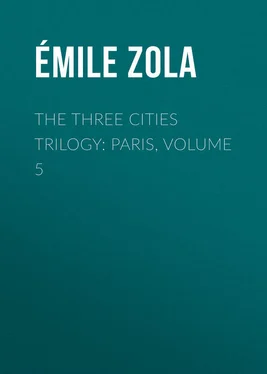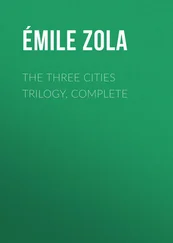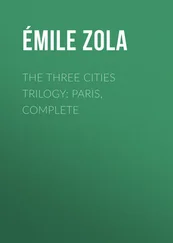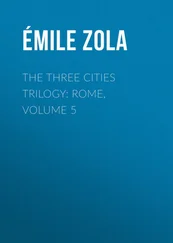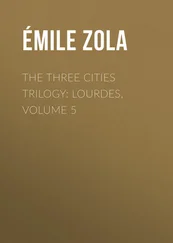Émile Zola - The Three Cities Trilogy - Paris, Volume 5
Здесь есть возможность читать онлайн «Émile Zola - The Three Cities Trilogy - Paris, Volume 5» — ознакомительный отрывок электронной книги совершенно бесплатно, а после прочтения отрывка купить полную версию. В некоторых случаях можно слушать аудио, скачать через торрент в формате fb2 и присутствует краткое содержание. Жанр: literature_19, foreign_antique, foreign_prose, на английском языке. Описание произведения, (предисловие) а так же отзывы посетителей доступны на портале библиотеки ЛибКат.
- Название:The Three Cities Trilogy: Paris, Volume 5
- Автор:
- Жанр:
- Год:неизвестен
- ISBN:нет данных
- Рейтинг книги:3 / 5. Голосов: 1
-
Избранное:Добавить в избранное
- Отзывы:
-
Ваша оценка:
- 60
- 1
- 2
- 3
- 4
- 5
The Three Cities Trilogy: Paris, Volume 5: краткое содержание, описание и аннотация
Предлагаем к чтению аннотацию, описание, краткое содержание или предисловие (зависит от того, что написал сам автор книги «The Three Cities Trilogy: Paris, Volume 5»). Если вы не нашли необходимую информацию о книге — напишите в комментариях, мы постараемся отыскать её.
The Three Cities Trilogy: Paris, Volume 5 — читать онлайн ознакомительный отрывок
Ниже представлен текст книги, разбитый по страницам. Система сохранения места последней прочитанной страницы, позволяет с удобством читать онлайн бесплатно книгу «The Three Cities Trilogy: Paris, Volume 5», без необходимости каждый раз заново искать на чём Вы остановились. Поставьте закладку, и сможете в любой момент перейти на страницу, на которой закончили чтение.
Интервал:
Закладка:
"Look out, here he comes!"
Who had spoken? A slight noise, that of the opening gate, made every heart throb. Necks were outstretched, eyes gazed fixedly, there was laboured breathing on all sides. Salvat stood on the threshold of the prison. The chaplain, stepping backwards, had come out in advance of him, in order to conceal the guillotine from his sight, but he had stopped short, for he wished to see that instrument of death, make acquaintance with it, as it were, before he walked towards it. And as he stood there, his long, aged sunken face, on which life's hardships had left their mark, seemed transformed by the wondrous brilliancy of his flaring, dreamy eyes. Enthusiasm bore him up – he was going to his death in all the splendour of his dream. When the executioner's assistants drew near to support him he once more refused their help, and again set himself in motion, advancing with short steps, but as quickly and as straightly as the rope hampering his legs permitted.
All at once Guillaume felt that Salvat's eyes were fixed upon him. Drawing nearer and nearer the condemned man had perceived and recognised his friend; and as he passed by, at a distance of no more than six or seven feet, he smiled faintly and darted such a deep penetrating glance at Guillaume, that ever afterwards the latter felt its smart. But what last thought, what supreme legacy had Salvat left him to meditate upon, perhaps to put into execution? It was all so poignant that Pierre feared some involuntary call on his brother's part; and so he laid his hand upon his arm to quiet him.
"Long live Anarchy!"
It was Salvat who had raised this cry. But in the deep silence his husky, altered voice seemed to break. The few who were near at hand had turned very pale; the distant crowd seemed bereft of life. The horse of one of the Gardes de Paris was alone heard snorting in the centre of the space which had been kept clear.
Then came a loathsome scramble, a scene of nameless brutality and ignominy. The headsman's helps rushed upon Salvat as he came up slowly with brow erect. Two of them seized him by the head, but finding little hair there, could only lower it by tugging at his neck. Next two others grasped him by the legs and flung him violently upon a plank which tilted over and rolled forward. Then, by dint of pushing and tugging, the head was got into the "lunette," the upper part of which fell in such wise that the neck was fixed as in a ship's port-hole – and all this was accomplished amidst such confusion and with such savagery that one might have thought that head some cumbrous thing which it was necessary to get rid of with the greatest speed. But the knife fell with a dull, heavy, forcible thud, and two long jets of blood spurted from the severed arteries, while the dead man's feet moved convulsively. Nothing else could be seen. The executioner rubbed his hands in a mechanical way, and an assistant took the severed blood-streaming head from the little basket into which it had fallen and placed it in the large basket into which the body had already been turned.
Ah! that dull, that heavy thud of the knife! It seemed to Guillaume that he had heard it echoing far away all over that district of want and toil, even in the squalid rooms where thousands of workmen were at that moment rising to perform their day's hard task! And there the echo of that thud acquired formidable significance; it spoke of man's exasperation with injustice, of zeal for martyrdom, and of the dolorous hope that the blood then spilt might hasten the victory of the disinherited.
Pierre, for his part, at the sight of that loathsome butchery, the abject cutthroat work of that killing machine, had suddenly felt his chilling shudder become more violent; for before him arose a vision of another corpse, that of the fair, pretty child ripped open by a bomb and stretched yonder, at the entrance of the Duvillard mansion. Blood streamed from her delicate flesh, just as it had streamed from that decapitated neck. It was blood paying for blood; it was like payment for mankind's debt of wretchedness, for which payment is everlastingly being made, without man ever being able to free himself from suffering.
Above the square and the crowd all was still silent in the clear sky. How long had the abomination lasted? An eternity, perhaps, compressed into two or three minutes. And now came an awakening: the spectators emerged from their nightmare with quivering hands, livid faces, and eyes expressive of compassion, disgust and fear.
"That makes another one. I've now seen four executions," said Massot, who felt ill at ease. "After all, I prefer to report weddings. Let us go off, I have all I want for my article."
Guillaume and Pierre followed him mechanically across the square, and again reached the corner of the Rue Merlin. And here they saw little Victor Mathis, with flaming eyes and white face, still standing in silence on the spot where they had left him. He could have seen nothing distinctly; but the thud of the knife was still echoing in his brain. A policeman at last gave him a push, and told him to move on. At this he looked the policeman in the face, stirred by sudden rage and ready to strangle him. Then, however, he quietly walked away, ascending the Rue de la Roquette, atop of which the lofty foliage of Pere-Lachaise could be seen, beneath the rising sun.
The brothers meantime fell upon a scene of explanations, which they heard without wishing to do so. Now that the sight was over, the Princess de Harn arrived, and she was the more furious as at the door of the wine shop she could see her new friend Duthil accompanying a woman.
"I say!" she exclaimed, "you are nice, you are, to have left me in the lurch like this! It was impossible for my carriage to get near, so I've had to come on foot through all those horrid people who have been jostling and insulting me."
Thereupon Duthil, with all promptitude, introduced Silviane to her, adding, in an aside, that he had taken a friend's place as the actress's escort. And then Rosemonde, who greatly wished to know Silviane, calmed down as if by enchantment, and put on her most engaging ways. "It would have delighted me, madame," said she, "to have seen this sight in the company of an artiste of your merit, one whom I admire so much, though I have never before had an opportunity of telling her so."
"Well, dear me, madame," replied Silviane, "you haven't lost much by arriving late. We were on that balcony there, and all that I could see were a few men pushing another one about… It really isn't worth the trouble of coming."
"Well, now that we have become acquainted, madame," said the Princess, "I really hope that you will allow me to be your friend."
"Certainly, madame, my friend; and I shall be flattered and delighted to be yours."
Standing there, hand in hand, they smiled at one another. Silviane was very drunk, but her virginal expression had returned to her face; whilst Rosemonde seemed feverish with vicious curiosity. Duthil, whom the scene amused, now had but one thought, that of seeing Silviane home; so calling to Massot, who was approaching, he asked him where he should find a cab-rank. Rosemonde, however, at once offered her carriage, which was waiting in an adjacent street.
She would set the actress down at her door, said she, and the deputy at his; and such was her persistence in the matter that Duthil, greatly vexed, was obliged to accept her offer.
"Well, then, till to-morrow at the Madeleine," said Massot, again quite sprightly, as he shook hands with the Princess.
"Yes, till to-morrow, at the Madeleine and the Comedie."
"Ah! yes, of course!" he repeated, taking Silviane's hand, which he kissed. "The Madeleine in the morning and the Comedie in the evening… We shall all be there to applaud you."
"Yes, I expect you to do so," said Silviane. "Till to-morrow, then!"
Читать дальшеИнтервал:
Закладка:
Похожие книги на «The Three Cities Trilogy: Paris, Volume 5»
Представляем Вашему вниманию похожие книги на «The Three Cities Trilogy: Paris, Volume 5» списком для выбора. Мы отобрали схожую по названию и смыслу литературу в надежде предоставить читателям больше вариантов отыскать новые, интересные, ещё непрочитанные произведения.
Обсуждение, отзывы о книге «The Three Cities Trilogy: Paris, Volume 5» и просто собственные мнения читателей. Оставьте ваши комментарии, напишите, что Вы думаете о произведении, его смысле или главных героях. Укажите что конкретно понравилось, а что нет, и почему Вы так считаете.
